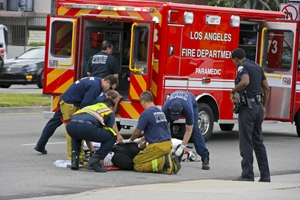The job of a first responder requires both physical and mental strength. Whether you are a firefighter, a policeman or an emergency medical technician, it is important that you are taking measures to help yourself prevent injury and that you know what to do if you become hurt on the job. With a variety of resources at your disposal for help, becoming familiar with the ways to recover from a physical or mental injury will help to enhance your overall safety and well-being.
First responders put themselves at risk for everything from serious stress disorders to back injuries in order to keep the community safe. If you are looking for helpful preventative measures to avoid injury in the future or for ways to recover from a previous accident you were in, use these tips to ensure that you are ready for any challenges that may come your way.
Injury prevention measures
While it is impossible to predict the events that may occur at the scene of an emergency, you can prepare for any physically demanding or stressful situations that you may find yourself in. Aside from wearing all of the proper equipment and using skills learned at training, there are a few additional ways to care for your mind and body on the job.
Emergencies can be stressful and chaotic, making clear communication crucial to successfully handling patients or victims. Asking for help from the officers around you when needed and only performing tasks on your own when you know you can handle them will drastically reduce your chances of hurting yourself.
When it comes to avoiding physical injuries, exercising vulnerable areas like the back will keep your body strong and less at risk for strains. Mental or stress disorders, on the other hand, take a different kind of preparation. Understanding what a traumatic event is and how to handle it is the first step.
According to the Trauma Center, a traumatic event is defined as when a servicemember experiences a serious threat or injury followed by a response of intense fear. The meaning that the event had for the individual is what makes it traumatic and can lead to serious conditions, such as post-traumatic stress disorder. Knowing that hyper-arousal and intrusive thoughts are warning signs that suggest you should seek help will prevent symptoms from becoming worse.
Tips for servicemembers facing injuries
The most essential step that first responders must take to successfully recover from a mental or physical injury is seeking the right help. This means both professional assistance if necessary and the support of loved ones. While finding support through physical therapy can be done for bodily injuries, getting help for mental harm is just as important but can be more challenging.
If you find yourself experiencing high levels of anxiety or depression following a traumatic event on the job, failing to find help can lead to worsening symptoms. For example, the Trauma Center noted that research has shown a strong link between symptoms of depression in the initial weeks after the traumatic experience and increased risk for PTSD.
Search for local or online support groups. The United States First Responders Association provides online assistance and community support from other servicemembers who may be experiencing similar symptoms.
As certain events at work may trigger anxiety or stress, experts recommend that those who have experienced trauma take a break from work and spend time recovering in their lives outside of service to get back on their feet. When transitioning back to your daily work routine, it is best to do so slowly and give yourself time to readjust.

